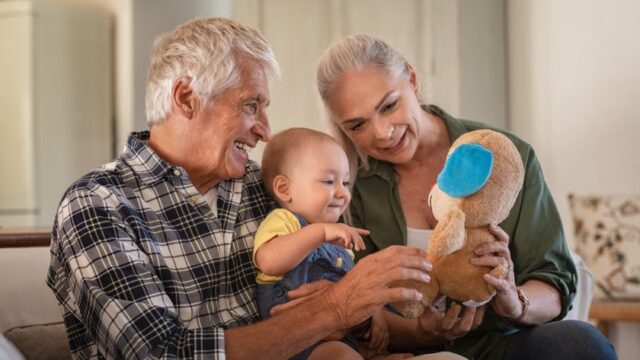Guide/Report
Guide for Providers: No-Cost Training Resources on Kinship/Grandfamily Mental Health Needs
Download This Resource


Background
Kinship families and grandfamilies form when grandparents, other relatives, or close family friends provide primary care for children whose parents are unable to do so. Kinship/ grandfamilies come together for a variety of reasons, including substance use, child welfare involvement, incarceration, mental and physical challenges, divorce, parental death, and military deployment. While research shows that kin caregivers and children benefit tremendously from these family arrangements, studies also indicate that kinship/ grandfamilies face unique difficulties. They “are disproportionally impacted by the opioid epidemic, child abuse and neglect, domestic violence, parental incarceration, financial instability, and serious mental illness.” They also face legal challenges, emotional traumas, loss of relationships, chronic stress, and disability, all while being forced to navigate unfamiliar systems of care.
A 2022 USAging survey, conducted with the Grandfamilies & Kinship Support Network, found that more than one-third of Area Agencies on Aging (AAAs) and Title VI Native American Aging Programs (Title VI programs) that offer services specifically for kinship/grandfamilies want training to address the mental health needs of these family members. In response to this need, this guide outlines no-cost mental health training resources for professionals and providers who interact with kinship/grandfamilies.
Using This Guide
The resources included in this guide were developed by different organizations for various audiences, including frontline workers, organizational managers, and kin caregivers. However, all resources contain information useful to staff from a range of professional backgrounds. Most can be read, viewed, or completed in 60 minutes or less (some in less than 15 minutes). Spanish-language resources are included when available.
Resources are grouped in sections covering broad categories of mental health needs.
- Section 1: General Challenges and Stressors Experienced by Kinship/Grandfamilies
- Section 2: Grief
- Section 3: Managing Challenging Behaviors in Young Children
- Section 4: Managing Challenging Behaviors in Older Children & Adults
- Section 5: Parental Substance Use
- Section 6: Trauma
- Section 7: Secondary Trauma
- Section 8: Trauma-Informed Principles for Organizations
- Section 9: Specific Populations
- Section 10: Trauma, Loss, and Grief Books for Children
- Section 11: Additional Resources
Sections 1 through 9 list resources, including articles, podcasts, recorded webinars, and videos, in alphabetical order by title. Each resource is presented with a brief description, a link to its web location, and a link to the organization that created or is hosting the resource. Section 10 lists books in alphabetical order by author and Section 11 lists and links to relevant organizations, agencies, and projects.
Note: Resources labeled with an asterisk (*) include contents that could be triggering to those with similar histories.
The resources offer an introduction to the mental health needs of kinship/grandfamilies and the stressors commonly faced by this population, as well as tips on supporting kinship/grandfamilies. However, these resources do not include instruction on mental health treatment, which should only be conducted by trained and licensed mental health professionals. Those seeking further study can find additional resources in Section 11.


